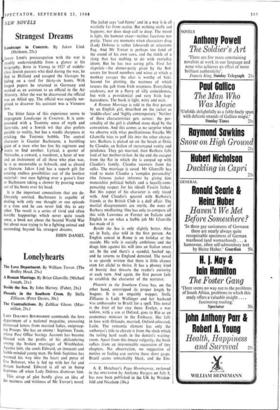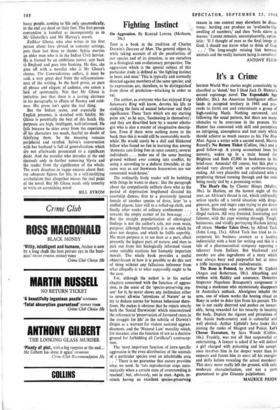Lonelyhearts
The Love Department. By William Trevor. (The Bodley Head, 25s.) A Roman Marriage. By Brian Glanville. (Michael Joseph, 21s.) Beside the Sea. By John Harvey. (Faber, 21s.)
Phoenix in the Southern Cross. By Stella Zilliacus. (Peter Davies, 30s.)
The Contradictions. By Zulfikar Ghose. (Mac- millan, 25s.)
LADY DOLORES BOURHARDIE commands the love department of a national magazine, answering distressed letters from married ladies, outproop- ing Proops. She has an enemy : Septimus Tuam, whose Post Office Savings Account has become bloated with the profits of his philandering among the broken marriages of Wimbledon. Against him, she sends Edward, an innocent and feeble-minded young man. He finds Septimus has wormed his way into the heart and purse of Eve Bolsover, who is fed up with her fat and distant husband. Edward is all set to bump Septimus off when Lady Dolores dismisses him.
This scrap of plot hardly gives an idea of the neatness and wittiness of Mr Trevor's novel. The jacket says 'sad-funny' and in a way it is all wistfully far from reality. But nothing really sad happens; nor does deep call to deep. The mood is light, the humour exact—neither facetious nor pretty. There are moments when characters drag (Lady Dolores is rather laboured) or situations flag. And Mr Trevor is perhaps too fond of the sound of his own saws, and the tinkle of a slang that has nothing to do with everyday idiom. But he has two saving gifts. First for slapstick—the dinner-party given by the Bol- sovers for board members and wives at which a monkey savages the char is worthy of Saki. Second for plotting, the neatness of which rescues the gab from Irish wispiness. Everything coalesces, not in a flurry of silly coincidences, but with a providential and very Irish hap- hazardness. The book is light, witty and neat.
A Roman Marriage is told in the first person by an English girl, described on the jacket as 'middle-class' and 'highly contemporary.' Neither of these characteristics gets across: the per- sonality of the girl is clubbed stone dead by the convention. And this comes as no surprise when we observe with what pusillanimous breaths Mr Glanville tries to puff life into the other charac- ters. Barbara is picked up on the beach at Ostia by Claudio, an Italian of stereotyped vanity and petulance. They get married, then Barbara falls foul of her mother-in-law. In the end she escapes from the flat in which she is cooped up with Claudio's family. Claudio recovers from his sulks. The marriage is saved. Mr Glanville has tried to make Claudio a 'complex personality' (the fatuous jacket informs) by giving him monarchist political beliefs and a heavily-com- pensating respect for his (dead) Fascist father. But this aspect of his character is only toyed with. And Claudio's quarrel with Barbara's friends at the British Club is a dull affair. The marital disagreements are sterile, the woes of Barbara unaffecting. One has only to compare all this with Lawrence or Forster on Italians and English to see what a feeble job Mr Glanville has made of it.
Beside the Sea is only slightly better. Also set in Italy, also told in the first person. An English consul in Rome is on holiday at the seaside. His wife is socially ambitious and she drags him against his will into an Italian smart set. In the end there's a scandal, hushed up, and he returns to England demoted. The novel is so sparely written that there is little chance even for cliché to thrive. It has a phoney kind of brevity that thwarts the reader's curiosity at each turn. And again, the first person fails to establish the character of the narrator.
Phoenix in the Southern Cross has, on the other hand, outstripped its proper length by leagues. It is an ungainly wopper. Stella Zilliacus is Lady Wallinger and her husband was ambassador to Brazil for a spell. This novel is the fruit of her stay there. Evelyn, a war widow, with a son at Oxford, goes to Rio as an economics minister in the Embassy. She falls in love with Orlando, married, Oxford-educated, Latin. The romantic element has only the authoress's title to elevate it from the slush which the toiling herd reads in the dentist's waiting- room. Apart from this innate vulgarity, the book suffers from an interminable succession of tiny chapters. No observation, no suggestion of motive or feeling can survive these short gasps. Brazil seems remarkably bleak, and the Em- A. E. Hotchner's Papa Hemingway, reviewed in the SPECTATOR by Anthony Burgess on July 8, has now been published in the UK by Weiden- feld and Nicolson (36s.)
bassy people, coming to life only spasmodically, in the end are dead on their feet. The first-person convention is handled as incompetently as in Mr Glanville's and Mr Harvey's novels.
Zulfikar Ghose, who also writes in the first person about love abroad in consular settings, puts these last three to shame. Sylvia marries an older man who is in the Indian Civil Service. He is framed by an ambitious junior, sent back to England and goes into banking. He dies, she goes off with a novelist who is Mr Ghose's chorus. The Contradictions suffers, it must be said, a very great deal from the self.-conscious- ness of the writing. In the hard prose, so pure of phrase and elegant of cadence, one senses a lack of spontaneity. Not that Mr Ghose is imitative, just that there is a jarring alertness in his paragraphs to effects of fluency and cold- ness. His prose isn't quite the real thing.
But the Indian scene, and especially the English presence, is sketched with fidelity. Mr Ghose is potentially the best of this batch. His Purposes are high, intelligent, well-informed. He fails because he shies away from the experience cif his characters too much, fearful no doubt of falsifying them. So the meaning remains peripheral and rarefied. Sylvia's conversation with her husband is full of generalisations which are not afterwards prosecuted to a significant point. And the novelist who intrudes at the end succeeds only in further removing Slyvia and the reader from the significance of the whole. The work dissolves in vague excuses about find- ing adequate figures for life, in a self-justifying aestheticism that altogether misses the real point of the novel. But Mr Ghose needs only temerity to write an astonishing novel.
BILL BYROM



































 Previous page
Previous page